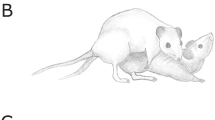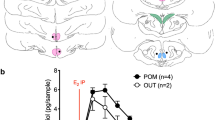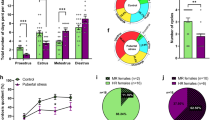Abstract
EVIDENCE derived chiefly from work on rodents suggests that androgens influence central nervous mechanisms underlying behaviour in two ways: first, during pre and neonatal development androgens differentiate mechanisms underlying male sexual behaviour1–3; second, in adulthood androgens activate mechanisms organized during development to induce the expression of male sexual behaviour4. Because male copulatory behaviour in rats is induced by the direct application of testosterone to hormone sensitive areas of the hypothalamus5,6 the process whereby androgens activate male sexual behaviour seems to have its focus in the hypothalamic areas of the brain. It is not known whether the hormone-sensitivity of hypothalamic mechanisms involved in the activation of male sexual behaviour is actively maintained by androgens or by other factors.
This is a preview of subscription content, access via your institution
Access options
Subscribe to this journal
Receive 51 print issues and online access
$199.00 per year
only $3.90 per issue
Buy this article
- Purchase on Springer Link
- Instant access to full article PDF
Prices may be subject to local taxes which are calculated during checkout
Similar content being viewed by others
References
Harris, G. W., and Levine, S., J. Physiol., 181, 379 (1965).
Young, W. C., Goy, R. W., and Phoenix, C. H., Science, 143, 212 (1964).
Goy, R. W., in Endocrinology and Human Behaviour (Oxford University Press, 1968).
Beach, F. A., J. Exp. Zool., 101, 91 (1946).
Davidson, M. J., Endocrinology, 79, 783 (1966).
Lisk, R. D., Endocrinology, 80, 754 (1967).
Hutchison, J. B., Nature, 216, 591 (1967).
Hutchison, J. B., thesis, Univ. Cambridge (1968).
Nalbandov, A. C., in Reproduction in the Female Mammal (Butter-worths, London, 1967).
Davis, D. E., Science, 126, 253 (1957).
Huber, C. G., and Crosby, E. C., J. Comp. Neurol., 48, 1 (1929).
Ifft, J. D., Anat. Rec., 148, 599 (1964).
Lincoln, D. W., J. Endocrinol., 37, 177 (1967).
Szentagothai, J., Flerko, B., Mess, B., and Halasz, B., Hypothalamic Control of the Anterior Pituitary, 298 (Akademiai Kiado, Budapest, 1962).
Author information
Authors and Affiliations
Rights and permissions
About this article
Cite this article
HUTCHISON, J. Changes in Hypothalamic Responsiveness to Testosterone in Male Barbary Doves (Streptopelia risoria). Nature 222, 176–177 (1969). https://doi.org/10.1038/222176a0
Received:
Revised:
Issue Date:
DOI: https://doi.org/10.1038/222176a0
Comments
By submitting a comment you agree to abide by our Terms and Community Guidelines. If you find something abusive or that does not comply with our terms or guidelines please flag it as inappropriate.



